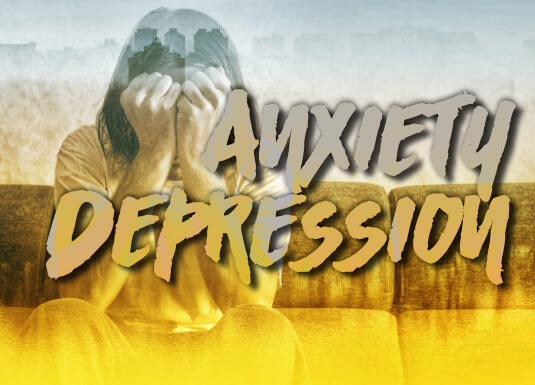Anxiety and depression are not the same but they often go together. They are the two most common mental health concerns in society and affect different people in different ways. People that suffer from an anxiety disorder usually also suffer from depression and people with depression usually also suffer from anxiety.
[lgc_column grid=”50″ tablet_grid=”50″ mobile_grid=”100″ last=”false”]
 [/lgc_column]
[/lgc_column]
[lgc_column grid=”50″ tablet_grid=”50″ mobile_grid=”100″ last=”true”]
Anxiety is the body’s natural response to danger when you feel threatened, under pressure or are facing a stressful situation. You can experience emotional, physical and behavioral symptoms described as uneasiness, fear or worry. In moderation anxiety is not a bad thing, but if your worries and fears become overwhelming and interfere with daily life you may be suffering from an anxiety disorder.
[/lgc_column]
SYMPTOMS OF ANXIETY:
[lgc_column grid=”50″ tablet_grid=”50″ mobile_grid=”100″ last=”false”]
- Fatigue
- Shortness of breath
- Chest pain/pressure
- Headaches
- Muscle Aches/trembling
- Twitching
[/lgc_column]
[lgc_column grid=”50″ tablet_grid=”50″ mobile_grid=”100″ last=”true”]
- Irritability
- Sweating
- Fear
- Racing thoughts and feelings of impending doom
- Often withdraw and avoid people or certain situations
[/lgc_column]
Depression is described as low energy and mood, low self-esteem and loss of interest or pleasure in things you once enjoyed. Most people feel anxious or depressed at times. Losing a job, going through a divorce, losing a love one and other difficult situations can make you feel sad, lonely, scared nervous or anxious. These feelings are normal reactions to life stressors. When these feelings interfere with your ability to work, sleep, eat and enjoy life you may be suffering from depression.
SYMPTOMS OF DEPRESSION:
[lgc_column grid=”50″ tablet_grid=”50″ mobile_grid=”100″ last=”false”]
- Too Much or Too Little Sleep
- Change in Appetite
- Irritability or Anxiety
- Headaches
- Loss of Energy
[/lgc_column]
[lgc_column grid=”50″ tablet_grid=”50″ mobile_grid=”100″ last=”true”]
- Feelings of Persistent Sadness or Guilt
- Hopelessness or Loss Of Self-Worth
- Memory Loss
- Challenges Concentrating or Making Decisions
- Thoughts of Death or Suicide
[/lgc_column]
Depression and anxiety can often be treated at the same time. Treatment should be made to help the person manage and reduce the symptoms of both depression and anxiety.
SOME TREATMENT OPTIONS:
- Medications
- Psychotherapy & Lifestyle Changes
REFERENCES: Anxiety & Depression Association of America (www.adaa.org), HELPGUIDE.org a trusted non-profit resource, National Institute of Mental Health (NIH)
